Understanding Biology
to Create Cures
The Interdisciplinary Biomedical Graduate Program has a strong track record of training success that begins with an emphasis on laboratory rotations and rigorous introduction to modern cell and molecular biology. After completing the first year of interdisciplinary training and selecting a dissertation mentor, students choose their area of specialization and PhD-granting program.
Applications for Fall 2026 are now closed.
Applications for Fall 2027 open September 1, 2026.

Biomedical research in the Molecular Pharmacology program investigates mechanisms of intracellular signaling through biochemical, molecular biological, biophysical, ultrastructural, and imaging approaches. This fundamental knowledge of cellular communication in health and disease provides the basis for the development and testing of new therapies.

The CMP program integrates cellular and molecular biology with the study of human diseases, often in the context of Regenerative Medicine with translational goals. Utilizing the latest technologies, students in the program have opportunities to study both normal and diseased tissues and cells in order to solve basic and applied research problems.

The Interdisciplinary Biomedical Graduate Program is designed to:
- Provide state-of-the-art Research Training that connects 2 key disciplines
- Build strong mentor-mentee relationships that promote the individual development of graduate students
- Empower graduate students to explore career opportunities and plan for the long-term
- Develop professional skills tailored to the individual needs and goals of graduate students
university on the move
Interdisciplinary Curriculum
Research rotations provide an opportunity to experience individual laboratory environments, including the techniques being used in the laboratory and the research questions being addressed.
Development of critical thinking skills is emphasized through an evaluation of experimental evidence and reading of primary literature. Problem-solving and principles in biomedical research are integrated through the analysis of mechanisms underlying biological phenomena.
A strong sense of community and support is the mainstay of the program. Mentors assigned by the program guide students through the selection of their first year research rotations and courses.
